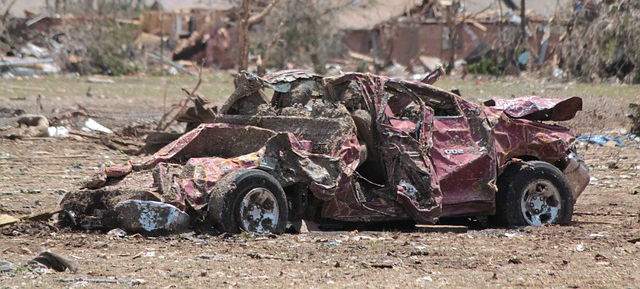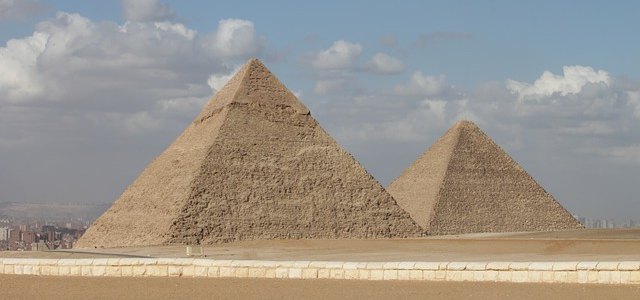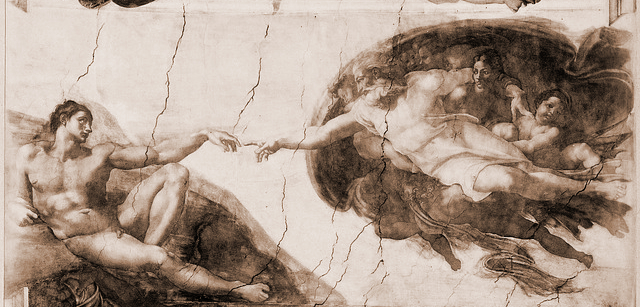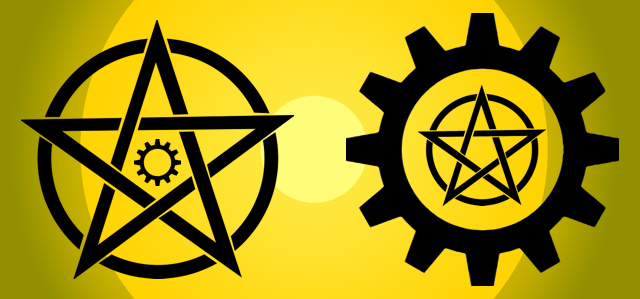[Way With Worlds appears at Seventh Sanctum, MuseHack, and Ongoing Worlds]
We’ve all had those moments where we’re just not inspired to build our world – or in writing in general. Other times we’re inspired but it’s actually not coming together, which is somehow worse. I imagine many a writer feels they exist inside a permanent form of writer’s block from which they escape only momentarily until their lack of creative forces drag them back to their prison.
With “World Blockage” it’s exceptionally daunting because worldbuilding is a complex process. A single idea or clever exercise may not spawn new continents or languages. An hour of effort may yield little results because the parts just won’t come together. It’s just as maddening as writer’s block, and you need something to jumpstart it.
You need inspiration – inspiration to build worlds. (more…)

[Way With Worlds appears at Seventh Sanctum, MuseHack, and Ongoing Worlds]
There you are, innocently writing along, and you look back on some of your published stories, perhaps to review, perhaps for fun, perhaps to see what past atrocities you committed on your language of choice. While doing this, you then see that which we all fear, the specter that haunts so many writers.
A continuity error.
Maybe it’s a spell working differently than it does later in your narrative, or you got a location wrong in some dialogue, or whatever. Something didn’t happen the way it should, its a violation of your continuity, and its been written and you can’t really take it out because its buried in the rest of the story and the world. Perhaps even your current works rely on that error, which is exceptionally humiliating and terrifying.
If you’re a continuity/setting fanatic like me, itís like having someone pour icewater over your heart. You violated your world, you messed up, you forgot, and probably you botched up future plots. Itís a terrible feeling of impotence, stupidity, and dread, a real cocktail of anguish.
Sure it happens to everyone, but right at that moment everyone is you.
In the words of a certain computerized book, Don’t Panic. Here’s some techniques to help you deal with what you do when you find you got your world wrong.
Did You Actually Make A Mistake?
First of all, you may find your mistake wasn’t one. Review your continuity, review the story. You may have written something that you knew subconsciously and forgot consciously. Or it may not even be a mistake when reviewed.
If you’re a jumpy writer, you can easily make the wrong assumption about things. I’ve seen it happens.
Make sure you’ve actually got a problem because trying to fix a non-problem can make things worse – like running off to fix the error that isn’t in your next story or game and building a huge plot around it. You’ll only complicate matters, and probably make real mistakes.
Is It A Matter Of Perspective?
The problem may be a problem – but only in a matter of perspective. A character may have said something wrong, but maybe that was their way of looking at it, or they mis-spoke (or could be assumed to mis-speak), and so on. The error may be there but it may be appropriate – or at least explainable (or ignorable until the next edition or a patch release of a game, if that).
The “error” may be a bit fuzzy. So maybe you can just ignore it or make a note of it if somehow it comes up again.
Can You Explain It?
OK, you determined there’s a problem. It’s not a mistake on your part, it’s not due to or explainable by perspective. You botched something in your setting.
It may not be that bad. Maybe it’s a character issue, like above, only a bit more pronounced than a simple “probably perspective” answer.. Maybe you can decide someone read something wrong in a textbook. Maybe the robe was green due to some peculiar superstition as opposed to the purple it was supposed to be.
Now if you can explain something, you may not have to go “fix things.” Keep a note in your worldbuilding journals and documents or something. If it’s not a big thing, then you may not need to worry. You’re covered just in case.
Can You Fix Something By Changing Things?
If you can’t explain (or hand-wave) away your problem, you may have to go fixing things in your setting. So maybe it’s time to tweak your world – if the error is big enough to require making some changes.
This is a pretty easy way to do things; slightly alter continuity to make up for errors. You’re probably doing this a little bit every now and then anyway as you tweak and poke ideas into shape or solidify them. This is also an effective but unradical solution.
Maybe a spell is less powerful than you wanted, so you decide “hey, that is the case” and you need to alter how someone survived an encounter (“after using magic then, I just managed to escape with a good run”). Or perhaps yeah, there was an exchange rate error (“man, remember how many credits I paid on that planet? Right before the rates went down?”). You get the idea. A little bit extra, a little tweak, can work wonders.
Just fixing things often leads to adding on new continuity, and it’s hard to distinguish the two. In fact . . .
Can You Fix It By Adding Something?
Look over the error. Maybe your continuity isn’t damaged, but needs something a bit extra to explain it. Take a look at what is supposedly wrong, and ask what addition to your continuity could make the wrong thing right. It may even turn into an interesting extra story element.
Perhaps you explain some dialogue errors by deciding a character is bad at geography, and over time confronts their poor educational background. Maybe your inconsistent writing about money can be explained by having fluctuating galactic exchange rates, which could be an interesting subplot if you’re writing an interplanetary war.
This isn’t much different than the above solution of making a change, except you’re deliberately grafting on a “patch” to your continuiy with something new.
Do not go throwing in something new into your world due to blind panic. It can create more problems down the road when your additions, included due to fear, create more continuity errors because they were created in a rush. Besides, you can get a kind of “mission creep” where you keep adding and adding ideas to fix problems, some caused by new additions, and it all spirals into a kind of perverse image of a creative rush.
Can You Fix It By Subtracting Something?
OK, maybe you can’t fix your error by adding something – perhaps there is a part of continuity that, when removed, fixes the problem and maintains continuity. After all, some parts are more necessary than others to your world.
Personally, I don’t like doing this, its a chance to create more problems, even moreso than adding elements to your continuity. A story universe can unravel quickly if you start yanking out threads of ideas, slowly becoming an unstable skeleton of it’s formal self.
I include it as an option, because it can work. The heroes weren’t ambushed by orcs that one time because, well, their tribal lands just don’t reach as far as thought. Or maybe there is no cure for that disease in the story (which means you get to throw an invent-a-cure subplot), or the cure was a fraud.
It can work. Use it with caution.
Retcontinuity
This is the Big Enchilada of correcting continuity mistakes. Its not for amateurs, and in some cases, not for professionals. This is correcting a mistake or mistakes (and big ones) by making them part of the story and the continuity. In short, the problems become part of the world.
We’re all too familiar with this happening in comics, where every few years someone decides to press the “Reboot universe button.” DC’s infamous “continuity collapse” in Zero Hour is perhaps one of the greatest examples, but your changes don’t have to be that radically. Actually they probably shouldn’t be.
But you could run with this and in the right hands it gets interesting. That little flaw can become a cornerstone to something greater. Decide that the time you got some important history wrong in your own world indicates a conspiracy that has altered historical records. A bunch of spells didn’t work right due to a hideous building magical fluctuation.
As you can see, this could quickly get out of hand. But, it is an option.
This is not an option I recommend unless you’re very, very sure you can do it right. I’ve seen ambitious undertakings like this, and its definitely not easy. However, it is an option, and it has the added advantage of turning a mistake into a whole new story idea and hopefully a firmer continuity.
I’m not exactly a fan of this method, but with great challenges come great possibilities.
One warning however is that if anyone asks, be the heck honest about it. Don’t act like you have a plan, just note you found a flaw, and in the effort of figuring it out a greater story emerged.
Besides, people will know.
Conclusion
A flaw in your continuity isn’t the end of the world so to speak, and in some cases isn’t worth worrying about. But when the time comes that you must address one, use the appropriate solution for the problem.
– Steven Savage

[Way With Worlds appears at Seventh Sanctum and at MuseHack]
A lot of what I write about worldbuilding is at least partially technical. It’s about breaking things into areas of analysis, questions, outlines, and more so you can make your world. Good worldbuilding is about thought and techniques and keeping track of things – well, half of it is.
The other half of worldbuilding is those wild ideas, those crazy thoughts, those “what ifs.” In many cases you’re either doing good with those moments of creativity, or organizing what thoughts you do have. Of course, not all of these moments come at the right time – sometimes you want to get organized and your brain won’t shut up, sometimes you want an idea and feel like a book-keeper.
Then where there’s those times that your worldbuilding comes together, when you grasp the big picture, when you get both the “wow” and the numbers behind it. That moment when you have A Vision and it all comes together.
Those moments you “get” your world, and those are the moments that are beautiful and powerful.
You probably know what I’m talking about and wish you could get into that state more.
The fact that I’m writing about this means I’m betting a good chunk of my readers can’t. (more…)
(Steve here – one of our regulars, “Solarius Scorch,” aka Michal, and I talked about him doing a little writing for the Sanctum. He’s got a killer discussion here of magic and economics, and writes both fiction and fanfic. Get ready to see your worldbuilding a bit differently . . .)
“Human behavior is economic behavior. The particulars may vary, but competition for limited resources remains a constant. Need as well as greed have followed us to the stars, and the rewards of wealth still await those wise enough to recognize this deep thrumming of our common pulse.”
– Nwabudike Morgan, „The Ethics of Greed” [Sid Meier’s Alpha Centauri]
As we know, humans (and human-like beings) are not rational in their decisions and actions. This irrationality means their choices are not always correct nor optimal, as defined by whatever measure we apply: wealth, happiness, reason or anything else. This is because we have various goals of different natures: we have material needs, emotional needs, preconceptions and simple desires, which often conflict with one another. Thus, people aren’t always rational… but they are always economical. (more…)

[Way With Worlds appears at Seventh Sanctum and at MuseHack]
Have you ever read a story and things just seemed to work . . . wrong?
- The hero defeats one guy and then the world is safe, the Evil Army is destroyed, he gets the girl, and his chin is still awesome?
- The superpowered alien who somehow manages to release massive, colorful, well-animated attacks that just well . . . have no side effects, no source, and no real explanation? I mean how do you release a “gravity buster” without messing up everything but the guy you aimed it at?
- The villain who’s massive, connected, complex plot works perfectly while in the real world you aren’t even sure the game you’re working on will ship without a day one patch and an apology?
You know that feeling. Things happen easily in stories and games – too easily. Cause and effect apparently are having a trial separation and you worry they’re going to get a divorce before the book ends.. Simple actions have massive and unwarranted repercussions. We snicker, we laugh, we roll our eyes – and we’re out of the world because things just work wrong.
A lot of world building is about Power, in the non-Machiavellian sense. It is about how something gets a result, and when you don’t make it work right in your world, then your world is no longer “real.”
Power, from super attacks to a clever cutting comment, done wrong makes a world unbelievable. If you’re building a setting, writing in a setting, you want to make sure that you don’t trip people up so they stumble out of your world. In building your world, you have to get the power of things, of people and weapons and comments and plans, right or the world is back to being words on paper or pixels in a game.
Fortunately I have a rule for getting it right. I call it the Pyramid Of Power. Which is a useful rule, and not the place Kephr-Ra, The Never-Dying, hid the Staff of Omens to keep it from Man-Cat and the Silvermasters. (more…)

After spending last column talking about characters in continuity, in world building, it’s time to talk about creating characters themselves.
I held this off until talking about the role characters play because of all aspects of world building, Character creation is the one that can (and in my opinion, should) be the most complex. As noted, a character is in a way the summary of the setting, and in turn, extremely complicated. Because they’re complicated, a sense of where they fit is important.
Characters are your setting come to visible, relatable life. Or at least should be.
The problem in discussing “how to create” characters is the process itself is also unpredictable, personal, and unique for everyone – just as characters are unique. So I can’t give you a system or even a list of questions that’ll “do it for you.” In fact, I shouldn’t because we all do this differently.
What I can do is give a list of techniques i’ve used, I’ve encountered, and I’ve coached on to help you create characters. Some you’re doing. Some you aren’t. Some will work. Some won’t – but would work for someone else.
But you can find what works for you.
After all I said it wasn’t simple. People never are – and that’s what you’re creating. (more…)
[Way With Worlds appears at Seventh Sanctum and at MuseHack]
You have built a world. You know it’s origins and its ecology, you know it’s people and their religion, you know technology or sorcery (or both) thta they use. You have a world that is a living-breathing creation, all in your head, and your documents, and your stories.
It’s time to populate it with characters. Sure you’ve probably started early, but we are going in order here.
Most of us creating worlds have them populated with people to tell stories about or to play (in the case of the game). Characters in a way are the start and the result of worldbuilding – the result of the worldbuilding we do to have people to tell a story about. More on that later, however.
So, where do you characters fit into all of this? Well, let’s take a look. (more…)

[Way With Worlds appears at Seventh Sanctum and at MuseHack]
Last column, I looked at writing magic and technology for your setting – and noted that in many ways for the sake of world building they could be treated the same. I still believe that, but I’d be remiss if I didn’t call out the differences as well. Or perhaps I should say “areas of variance,” as it gets complicated, but more on that shortly.
I believe it’s important to loo at differences, as in too many cases creating the magic and/or technology for a setting treats them as the same for all the wrong reason – as opposed to the right ones. Technology easily becomes hand-woven neutron particle miracle rays, a mythology with lab tools and circuit boards. Magic can get systematized or explained in such a way it either is technology, or is really just magic wearing technologies clothes and wandering around looking out of place.
So, having suggested that you have to look at them as similar for the sake of worldbuilding, I now want to deal with when you have to look at them differently. Yes, this may produce writing whiplash, but who said worldbuilding was going to be boring and straightforward? I certainly didn’t promise that.
Think of it as general and specifics. In general, they’re the ways people change and affect the world. In specifics, well . . . (more…)

[Way With Worlds appears at Seventh Sanctum at at MuseHack]
We’ve all heard the saying that goes “Any sufficiently advanced technology is indistinguishable from magic” made by the incomparable Sir Arthur C. Clarke.
I would ad a corollary, especially in the worlds of world building (and perhaps in an age of mind hacking and psychological techniques, our own). “Any sufficiently organized magic is indistinguishable from technology.”
Because when you world build, you’re getting things organized in your head to explain how they work. In the case of Magic and Technology, they’re really the same thing most of the time. Not entirely, but mostly.
Now you may wish to argue with this, but for the sake of building a setting, magic and technology are no different. I would state that magic and technology are the ways characters manipulate themselves and the elements of their settings to achieve results fitting a specific goal – and thus really no different.
Vaccum tubes and potions, ethereal forces and electrical energy, it’s all about Making Stuff Happen. So for the rest of this essay, I’ll just call it MaT since I can’t figure any other word to encompass the two of them, and I won’t call it MT as it invites innumerable jokes.
As a world builder, you just have to figure out what it all means. That’s when it gets complicated. (more…)

[Way With Worlds appears at Seventh Sanctum at at MuseHack. It focuses on worldbuilding as a writer or setting designer and is included here to help our readers who craft fictional settings]
We’ve talked origins, ecologies, and sentient life in your settings We’ve discussed the culture that your intelligent life will have (again, if your story has intelligent life). Now it’s time to get to economics which, much like real life has a lot of impact, but isn’t something we often think of (or think of fondly).
My guess is that upon hearing that “it’s economics time”, you’re probably not filled with enthusiasm. If you are, great, but in general I find that, when he subject of world building and economics comes up, most people’s reactions are less than positive. Sometimes they’re pretty negative.
Most people’s reactions to anything involving economics is usually not positive, often a mix of regret, ignorance, and understandable rage. I could go on about the why of that for awhile, but that’s best for another time. Let’s go forward with the assumption that, in general, you need a bit of a boost and guidance on writing economics in your world.
If you do enjoy this (like me), then read on anyway just in case, and welcome to the club.
Now let me say off the bat that if you don’t get into the economics of world building that with the right perspective it’s interesting, informative, and even fun. I also would note that it can’t be avoided at all because, like real life, economics is everywhere. But I’ll focus on the fun part. (more…)






